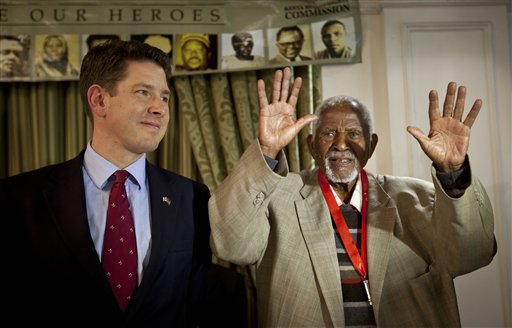After a long legal battle, the British goverment has apologized and agreed to pay £19.9 million (about $30 million) to thousands of Kenyans who were totured between 1951 and 1962 in the Mau Mau uprising.
One of the people tortured during the Kenyan conflict was reportedly Barack Obama’s grandfather, as reported in 2011 by the British Daily Mail:
Obama’s grandfather Hussein Onyango Obama was rounded up in 1949 in the very early days of the rebellion and spent two years in a high security prison. Once a cook for a British officer, his family claim Mr Obama was horrifically tortured, whipped every morning and evening until he confessed.
His third wife Sarah Onyango said white jailers would squeeze his testicles with parallel metallic rods and pierce his nails and buttocks with pins. Mr Obama, whose involvement with the rebellion has never been clear, was left permanently scarred and bitterly anti-British.
This story was disputed, however, in an Obama biography that came out last year. As The Telegraph reported:
It is a harrowing tale of torture in a colonial prison in Kenya that is said to explain the President’s coolness towards Britain and even his removal of Winston Churchill’s bust from the Oval Office.
David Maraniss, the author of Mr Obama’s most comprehensive biography so far, said five associates of Hussein Onyango Obama doubt he was even jailed. One told him: “People make up stories”.
British officials fought the suit on the grounds that a fair trial would be impossible after so long, an argument rejected by the court. Although the matter was decades old, a confluence of events made it nearly impossible to litigate until recently. The Mau Mau were still outlawed in Kenya until 2003, so the plaintiffs weren’t able to free discuss legal action until then. The British military kept extensive records of their activities and that archival material surfaced in two books in 2005. Legal proceedings began in 2006.
The Kenyan Human Rights Commission has hailed the ruling as a “test case” that has the potential to open up the U.K. for similiar suits from other former British colonies.
The forgiegn ruling may have an impact in the Unites States, as well. The movement to force the United States to pay reparations for slavery used Germany’s payments to Holocaust survivors as a precendent, as this 2002 article points out:
Reparations of one sort or another has become a common topic in recent history. The United States government has paid $20,000 to each Japanese-American imprisoned in World War II internment camps. Since the 1950s, the German government has provided monetary compensation to Holocaust survivors, with the most recent settlement promising to establish a $4.8 billion fund to compensate slave and forced laborers during the war. And in February of this year, an Oklahoma commission recommended compensation for survivors of the 1921 Tulsa race riots and their descendants.
Encouraged by these success stories, several African-American groups now want reparations for the injustices of slavery. Living on the Lower East Side with her husband and 6-month-old baby, Farmer-Paellmann, 35, is on a personal crusade to recover what she believes has been taken away from her and the other descendants of slaves.
The toture described in the British suit is truly horrific. From the Daily Mail:
(One claimant) was then castrated, he claims, and was left without medical attention for two days before the prison was over-run by Mau Mau rebels.
A second claimant also claims he was castrated while another says she was sexually assaulted with bottles filled with hot water.
Another claimant Wambugu wa Nyingi says he was ‘suspended by his feet from the hut roof.
‘He was then subjected to a severe beating over a period of about 30 minutes, while cold water was poured on to his face and into his mouth so he could not breathe.’
However, the Mau Mau themselves were also participants in what the U.K.’s The Telegraph describes as a ‘brutal civil war’;
Many Africans bitterly opposed the Mau Mau and, throughout the emergency, Africans were its principal victims. During eight years of fighting, the Mau Mau killed 32 white settlers–and as many as 5,000 Africans. In the Lari massacre of 1953, perhaps 120 African “loyalists” who backed the British were hacked or burned to death.
Should the people tortured by Mau Mau be entitled to be compensated for their pain and suffering? There are a number of difficult legal and moral questions posed by using the legal system to redress decades old horrors of war. Expect more debate, as the British settlement could open the floodgates.

COMMENTS
Please let us know if you're having issues with commenting.